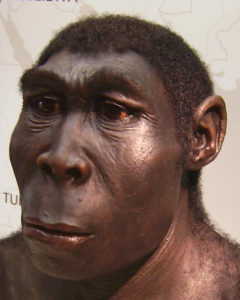As an editor, I’m a stickler for words. Juggling and switching out words for a living, I have my favorites but also my peeves, words that are so innately clumsy, misleading, or cringe-worthy that I just want to get rid of them.

Reconstruction of our ancestor. I don’t know why he has a haircut, either.
This is why I think we should rename our solar system’s most unfortunately named planet Minerva (even starting an ill-fated petition), and think we should be careful about naming that yet-undiscovered planet that might be responsible for shenanigans out in the boondocks. I’ve also ranted about renaming the Stone Age and (more often that I care to link) recasting how we discuss literary genre.
Well, I’ve found another cause. In the wake of recent archaeological finds, the term “Denisovan” has joined “Neanderthal” as a common term of reference for an extinct form of human being. We could, perhaps, use “Heidelberger” for Homo heidelbergensis. Other human species suggest ready common terms: Rudolfian, Habilis, Floresian, Ergaster, Antecessor.
But Homo erectus? At least in English, this scientific name suffers the same cringe-worthiness as “Uranus.” Urine-us? Your anus? And, the species name is misleading. Our ancestors had been standing upright long before these folks came along.
I would rename this species. Given that they broke out of Africa and spread throughout the Old World, I discovered a few names that had similar Middle-School-humor problems. Homo pervagatus, “widespread man.” Homo colonicus, “colonizing man.” Go ahead, chuckle.
But, given the exploratory spirit of this grandparent, I found a good alternative: Homo intrepidus, “intrepid man.” We could call them Intrepids in common parlance, where they could take their proper place alongside Denisovans and Neanderthals.
Now, if only we could ditch the clutzy “anatomically modern humans” and “behaviorally modern humans” and just start calling ourselves Sapiens. Even as self-congratulatory as that might be.
